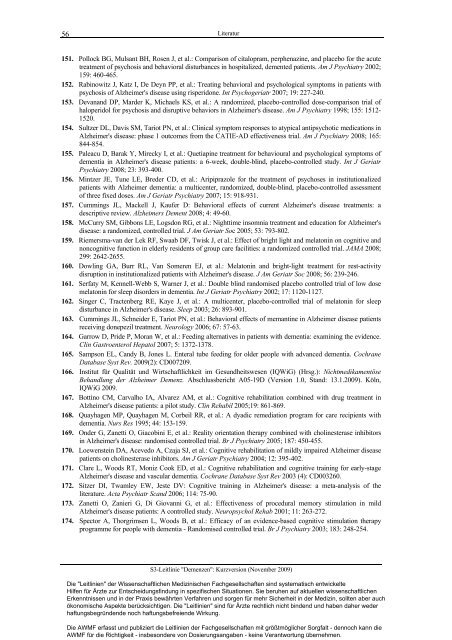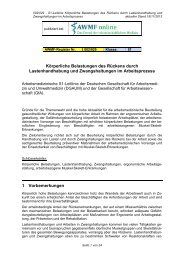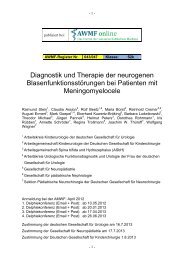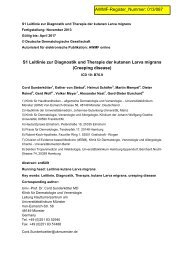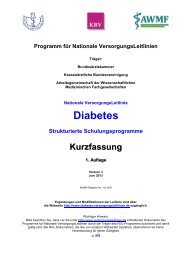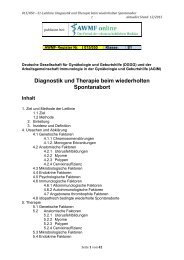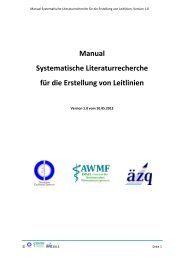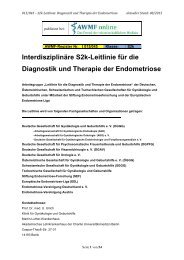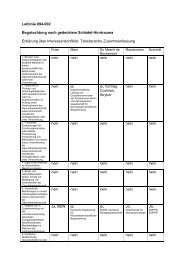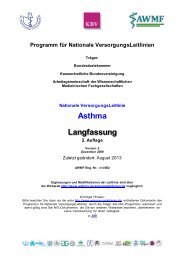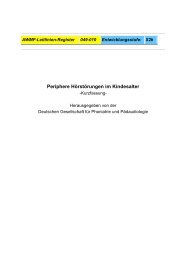S3-Leitlinie Demenzen (Kurzversion) - AWMF
S3-Leitlinie Demenzen (Kurzversion) - AWMF
S3-Leitlinie Demenzen (Kurzversion) - AWMF
Sie wollen auch ein ePaper? Erhöhen Sie die Reichweite Ihrer Titel.
YUMPU macht aus Druck-PDFs automatisch weboptimierte ePaper, die Google liebt.
56<br />
Literatur<br />
151. Pollock BG, Mulsant BH, Rosen J, et al.: Comparison of citalopram, perphenazine, and placebo for the acute<br />
treatment of psychosis and behavioral disturbances in hospitalized, demented patients. Am J Psychiatry 2002;<br />
159: 460-465.<br />
152. Rabinowitz J, Katz I, De Deyn PP, et al.: Treating behavioral and psychological symptoms in patients with<br />
psychosis of Alzheimer's disease using risperidone. Int Psychogeriatr 2007; 19: 227-240.<br />
153. Devanand DP, Marder K, Michaels KS, et al.: A randomized, placebo-controlled dose-comparison trial of<br />
haloperidol for psychosis and disruptive behaviors in Alzheimer's disease. Am J Psychiatry 1998; 155: 1512-<br />
1520.<br />
154. Sultzer DL, Davis SM, Tariot PN, et al.: Clinical symptom responses to atypical antipsychotic medications in<br />
Alzheimer's disease: phase 1 outcomes from the CATIE-AD effectiveness trial. Am J Psychiatry 2008; 165:<br />
844-854.<br />
155. Paleacu D, Barak Y, Mirecky I, et al.: Quetiapine treatment for behavioural and psychological symptoms of<br />
dementia in Alzheimer's disease patients: a 6-week, double-blind, placebo-controlled study. Int J Geriatr<br />
Psychiatry 2008; 23: 393-400.<br />
156. Mintzer JE, Tune LE, Breder CD, et al.: Aripiprazole for the treatment of psychoses in institutionalized<br />
patients with Alzheimer dementia: a multicenter, randomized, double-blind, placebo-controlled assessment<br />
of three fixed doses. Am J Geriatr Psychiatry 2007; 15: 918-931.<br />
157. Cummings JL, Mackell J, Kaufer D: Behavioral effects of current Alzheimer's disease treatments: a<br />
descriptive review. Alzheimers Dement 2008; 4: 49-60.<br />
158. McCurry SM, Gibbons LE, Logsdon RG, et al.: Nighttime insomnia treatment and education for Alzheimer's<br />
disease: a randomized, controlled trial. J Am Geriatr Soc 2005; 53: 793-802.<br />
159. Riemersma-van der Lek RF, Swaab DF, Twisk J, et al.: Effect of bright light and melatonin on cognitive and<br />
noncognitive function in elderly residents of group care facilities: a randomized controlled trial. JAMA 2008;<br />
299: 2642-2655.<br />
160. Dowling GA, Burr RL, Van Someren EJ, et al.: Melatonin and bright-light treatment for rest-activity<br />
disruption in institutionalized patients with Alzheimer's disease. J Am Geriatr Soc 2008; 56: 239-246.<br />
161. Serfaty M, Kennell-Webb S, Warner J, et al.: Double blind randomised placebo controlled trial of low dose<br />
melatonin for sleep disorders in dementia. Int J Geriatr Psychiatry 2002; 17: 1120-1127.<br />
162. Singer C, Tractenberg RE, Kaye J, et al.: A multicenter, placebo-controlled trial of melatonin for sleep<br />
disturbance in Alzheimer's disease. Sleep 2003; 26: 893-901.<br />
163. Cummings JL, Schneider E, Tariot PN, et al.: Behavioral effects of memantine in Alzheimer disease patients<br />
receiving donepezil treatment. Neurology 2006; 67: 57-63.<br />
164. Garrow D, Pride P, Moran W, et al.: Feeding alternatives in patients with dementia: examining the evidence.<br />
Clin Gastroenterol Hepatol 2007; 5: 1372-1378.<br />
165. Sampson EL, Candy B, Jones L. Enteral tube feeding for older people with advanced dementia. Cochrane<br />
Database Syst Rev. 2009(2): CD007209.<br />
166. Institut für Qualität und Wirtschaftlichkeit im Gesundheitswesen (IQWiG) (Hrsg.): Nichtmedikamentöse<br />
Behandlung der Alzheimer Demenz. Abschlussbericht A05-19D (Version 1.0, Stand: 13.1.2009). Köln,<br />
IQWiG 2009.<br />
167. Bottino CM, Carvalho IA, Alvarez AM, et al.: Cognitive rehabilitation combined with drug treatment in<br />
Alzheimer's disease patients: a pilot study. Clin Rehabil 2005;19: 861-869.<br />
168. Quayhagen MP, Quayhagen M, Corbeil RR, et al.: A dyadic remediation program for care recipients with<br />
dementia. Nurs Res 1995; 44: 153-159.<br />
169. Onder G, Zanetti O, Giacobini E, et al.: Reality orientation therapy combined with cholinesterase inhibitors<br />
in Alzheimer's disease: randomised controlled trial. Br J Psychiatry 2005; 187: 450-455.<br />
170. Loewenstein DA, Acevedo A, Czaja SJ, et al.: Cognitive rehabilitation of mildly impaired Alzheimer disease<br />
patients on cholinesterase inhibitors. Am J Geriatr Psychiatry 2004; 12: 395-402.<br />
171. Clare L, Woods RT, Moniz Cook ED, et al.: Cognitive rehabilitation and cognitive training for early-stage<br />
Alzheimer's disease and vascular dementia. Cochrane Database Syst Rev 2003 (4): CD003260.<br />
172. Sitzer DI, Twamley EW, Jeste DV: Cognitive training in Alzheimer's disease: a meta-analysis of the<br />
literature. Acta Psychiatr Scand 2006; 114: 75-90.<br />
173. Zanetti O, Zanieri G, Di Giovanni G, et al.: Effectiveness of procedural memory stimulation in mild<br />
Alzheimer's disease patients: A controlled study. Neuropsychol Rehab 2001; 11: 263-272.<br />
174. Spector A, Thorgrimsen L, Woods B, et al.: Efficacy of an evidence-based cognitive stimulation therapy<br />
programme for people with dementia - Randomised controlled trial. Br J Psychiatry 2003; 183: 248-254.<br />
<strong>S3</strong>-<strong>Leitlinie</strong> "<strong>Demenzen</strong>": <strong>Kurzversion</strong> (November 2009)<br />
Die "<strong>Leitlinie</strong>n" der Wissenschaftlichen Medizinischen Fachgesellschaften sind systematisch entwickelte<br />
Hilfen für Ärzte zur Entscheidungsfindung in spezifischen Situationen. Sie beruhen auf aktuellen wissenschaftlichen<br />
Erkenntnissen und in der Praxis bewährten Verfahren und sorgen für mehr Sicherheit in der Medizin, sollten aber auch<br />
ökonomische Aspekte berücksichtigen. Die "<strong>Leitlinie</strong>n" sind für Ärzte rechtlich nicht bindend und haben daher weder<br />
haftungsbegründende noch haftungsbefreiende Wirkung.<br />
Die <strong>AWMF</strong> erfasst und publiziert die <strong>Leitlinie</strong>n der Fachgesellschaften mit größtmöglicher Sorgfalt - dennoch kann die<br />
<strong>AWMF</strong> für die Richtigkeit - insbesondere von Dosierungsangaben - keine Verantwortung übernehmen.


